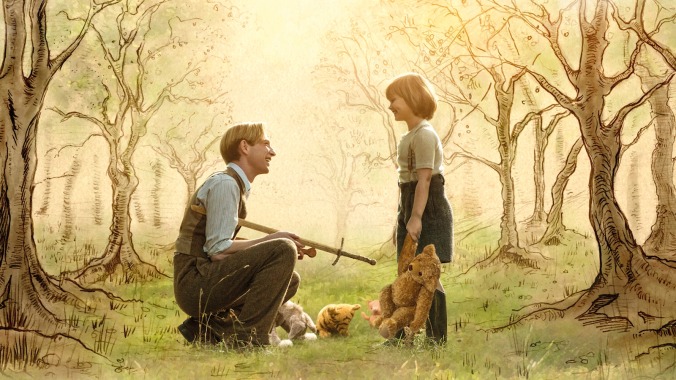A.A. Milne, who was a second-rate playwright and poet, somehow created perfect, delightfully written children’s literature with his stories of Winnie-The-Pooh, Piglet, and the other denizens of the Hundred Acre Wood. How did he do it? Goodbye Christopher Robin, an insipid and miscalculated drama about the English writer’s family life, insinuates that it had something to do with his inadequacies as a parent and a social critic; this is a man who can barely make time for his son, Christopher Robin “Billy Moon” Milne, and who harrumphs, “I’ve had enough of making people laugh—I want to make them see!” (Sadly, the line is unintentionally funny.) For legal reasons, the film doesn’t include a word of Milne’s writings or any of E. H. Shepard’s original illustrations. Instead, director Simon Curtis, the purveyor of such middlebrow fluff as Woman In Gold and My Week With Marilyn, lays the sentimental hues and sunbeams on thick, hoping that someone will give a shit.
Cast as a character seen mostly in middle age, the still boyish Domhnall Gleeson plays Milne stiffly, aided by aging make-up that sometimes makes him look like Billy Drago in The Untouchables. We are introduced to him in a sequence of pointlessly nested flashbacks, conveyed through tacky match cuts. An angry, fiftysomething Milne pitches a cricket ball in slow motion and—voilà!—it becomes a grenade sparkling over the trenches of World War I; he lumbers into a dugout and—presto!—he is wearing a tux at one of those posh society gatherings where the guests speak exclusively in exposition. The Great War is over, and Milne is trying to get his writing career back on track, despite the post-traumatic panic attacks that will eventually lead him to relocate from noisy London to a quiet house near the East Sussex woodlands, which will end up inspiring Pooh’s Hundred Acre Wood.
Unlike the similar-in-concept Finding Neverland and Saving Mr. Banks—which sugarcoated the creepy, tragic stories and bitter personality conflicts behind Peter Pan and the Disney version of Mary Poppins—Goodbye Christopher Robin at least tries to make something out of Milne’s personal flaws by putting his shaky relationship with his young son (Will Tilston), who inspired the Winnie-The-Pooh stories, front and center. Raised mostly by his nanny, “Nou” (Kelly Macdonald), young Billy Moon rarely spends time with his father or his mother, Daphne (Margot Robbie, doing a drama-kid approximation of an upper-class Brit). The success of Pooh turns the little boy into a child celebrity, subjected to exploitative radio interviews and terrifying publicity stunts with real bears.
There might be the makings of a much darker story buried in the sickly, syrupy goo. But Goodbye Christopher Robin can barely articulate itself; Curtis’ sense of such basics as the passage of time is baffling, and his clunky, stage-and-BBC-trained style is inevitably constrained by the performances (mostly thankless) and by Frank Cottrell Boyce and Simon Vaughan’s clumsy script. Never hinting at the wit or philosophizing of the Pooh stories, the film mostly makes Milne look like an inexpressive hack. Maybe there’s some element of a self-portrait in there.



![HBO teases new Euphoria, Larry David, and much more in 2026 sizzle reel [Updated]](https://img.pastemagazine.com/wp-content/avuploads/2025/12/12100344/MixCollage-12-Dec-2025-09-56-AM-9137.jpg)





































